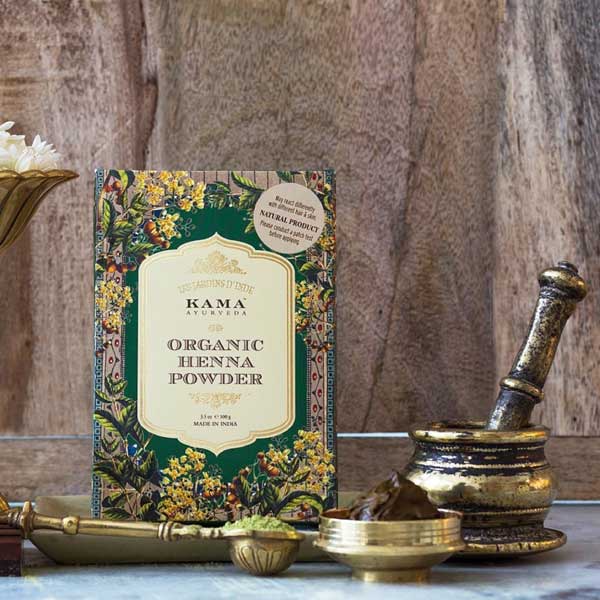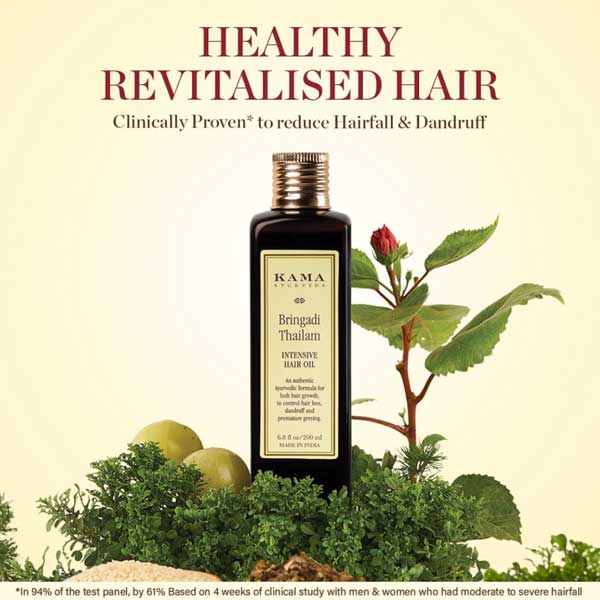Are you looking to revive your natural hair color or combat the early signs of graying? While it’s not always possible to reverse hair graying to your natural color, some home remedies can help you darken your hair. These remedies for black hair offer a range of options to suit different hair types and needs.
And the best part is that you can use them regularly without worrying about the side effects that come with using chemical and synthetic hair dyes.
20 Best Home Remedies For Black Hair
These remedies are not just about achieving a darker shade; they're also about nourishing your hair from the roots to the tips, ensuring it stays healthy, vibrant, and full of life.
1. Mustard Oil
Rich in antioxidants, vitamins, and minerals, mustard oil stimulates hair growth and improves melanin production, which darkens hair.
Mustard oil is also known to stimulate blood circulation in the scalp. Research suggests that improved blood circulation to hair follicles may help in pigment retention.
How to use:
Warm the mustard oil slightly. Massage it into your scalp and through your hair. Cover your hair with a shower cap and leave it on for about 30-60 minutes, then shampoo as usual.
2. Amla Powder
Amla (Indian gooseberry) is high in vitamin C and tannins, which promote hair pigmentation.
Amla is also rich in antioxidants. Studies have shown that antioxidants can protect hair follicles from damage by free radicals, potentially slowing down graying.
How to use:
Mix amla powder with lukewarm water to create a smooth paste. Apply it to your hair and scalp, ensuring full coverage. Leave it on for about 45-60 minutes. Rinse with lukewarm water.
3. Henna Powder
Henna naturally dyes hair with a reddish hue, which can appear darker on some hair types.
The Lawsonia inermis plant, from which henna is derived, has been historically used for hair coloring and conditioning. Its natural dyeing properties are attributed to lawsone, a compound present in henna leaves.
How to use:
Mix henna powder with water, tea, or coffee and let it sit for several hours. Apply the paste to hair, leave it for a few hours, then rinse.

4. Indigo Powder Dye
Indigo, when used after henna, can turn hair from reddish-brown to black.Its effectiveness as a natural dye has been recognized for centuries.
How to use:
First, apply henna as described earlier. Then mix indigo powder with water to create a paste. Apply it evenly to your hair, leave it for 1-2 hours depending on the desired shade, and then rinse off.
5. Walnut Shells
Walnut shells contain a natural dye known as juglone. Research indicates that juglone can impart a strong natural dye, which is why walnut shell powder is often used in natural hair coloring formulas.
How to use:
Crush walnut shells and boil them in water for 30 minutes. Strain the liquid and let it cool. After shampooing, use the strained liquid as a final rinse. Repeat regularly for best results.
6. Black Tea Rinse
Black tea contains tannins that can darken hair.
The tannins in black tea can also contribute to strengthening hair strands. Regular use of black tea rinses can reduce hair shedding, according to some anecdotal evidence.
How to use:
Brew a strong black tea and let it cool. After shampooing your hair, use the tea as a final rinse. Leave it on for 20-30 minutes before rinsing with cold water.
7. Coffee
Coffee contains dark pigments that can stain hair, giving it a darker appearance.
The caffeine in coffee not only darkens hair but is also believed to stimulate hair growth, as suggested by some studies. It’s thought to target DHT, the hormone responsible for hair loss.
How to use:
Brew a strong cup of coffee and let it cool. Mix it with your regular hair conditioner. Apply this mixture to your hair, leaving it on for 20-30 minutes. Rinse thoroughly.
8. Methi Seeds (With Amla)
Methi (fenugreek) seeds are rich in folic acid, Vitamin A, Vitamin K, and Vitamin C, and are a powerhouse of minerals. These nutrients are known to boost scalp health and prevent hair loss.
How to use:
Soak methi seeds in water overnight. Grind them to a paste and mix with amla powder and water. Apply the mixture to your hair and scalp. Leave it on for about an hour, then rinse.
9. Almond Oil And Lemon Juice
Almond oil is rich in Vitamin E, which is known for its hair nourishing properties. Lemon juice, while slightly acidic, can help in cleansing the scalp and removing dead cells.
Almond oil nourishes the hair while lemon juice provides a natural shine that makes dark hair appear richer.
How to use:
Mix a few drops of lemon juice with a tablespoon of almond oil. Massage into your scalp and through your hair. Leave it on for about 45 minutes, then shampoo as usual.
10. Curry Leaves and Oil
Curry leaves are known to restore melanin in the hair, the pigment responsible for hair color.
Curry leaves are also a source of beta-carotene and proteins, which can reduce hair loss and increase hair growth. The combination with coconut oil enhances the penetration of these nutrients into the scalp.
How to use:
Boil a handful of curry leaves in coconut oil until they turn black. Let the oil cool, then apply it to your scalp and hair. Leave it overnight and wash your hair in the morning.
11. Ridge Gourd Oil
Ridge gourd is believed to restore the pigment cells in hair follicles.
Ridge gourd is also traditionally known for its enriching properties in terms of hair health. It’s believed to restore the natural pigment of the hair and improve texture.
How to use:
Sun-dry ridge gourd slices and soak them in coconut oil for 3-4 days. Strain the oil and apply it to your scalp and hair. Leave it on for at least an hour, then wash off with a mild shampoo.
12. Onion Juice
Onion juice can improve hair health and, due to its sulfur content, potentially affect hair color and nourish hair follicles.
How to use:
Grate or blend an onion to extract its juice. Apply the juice to your scalp and hair. Leave it on for 30 minutes, then wash your hair with a mild shampoo.
13. Shikakai Powder
Shikakai adds a subtle dark tint to the hair. Shikakai also has a low pH, making it a great natural cleanser that doesn’t strip hair of its natural oils. Its saponins gently cleanse the scalp and hair.
How to use:
Mix shikakai powder with water to form a paste. Use it in place of shampoo. Massage into your scalp and hair, leave it on for a few minutes, then rinse thoroughly.
14. Black Pepper and Lemon Dye
Black pepper contains natural pigments and, combined with lemon, can darken hair. Black pepper contains piperine, a compound that could potentially stimulate pigmentation. However, this application should be used with caution due to the potential for skin irritation.
How to use:
Mix a tablespoon of freshly ground black pepper with the juice of one lemon. Apply to your hair, focusing on the roots. Leave it on for about an hour, then rinse with cool water.
15. Bhringraj
Bhringraj (Eclipta alba) is known for its medicinal properties, particularly in Ayurveda for hair growth and color restoration.
How to use:
Mix Bhringraj powder with water to make a paste. Apply to your scalp and hair. Leave it on for about an hour, then rinse off with lukewarm water. Alternatively, you can use Bhringraj infused oil like Kama Ayurveda’s Bringadi Intensive Hair Treatment.

16. Hibiscus
Hibiscus nourishes the hair and can add reddish highlights, which appear darker on some hair colors.
Hibiscus is also rich in amino acids, Vitamin A, Vitamin C, and alpha-Hydroxy acids along with other nutrients, which are beneficial for the scalp and hair.
How to use:
Grind hibiscus flowers to make a paste. Apply it to your hair and scalp. Leave it on for about an hour, then rinse off with lukewarm water.
17. Mulethi and Ghee
Mulethi, or licorice root, enhances hair by darkening, thickening, and adding shine. Ghee tackles dryness and frizz with its deep moisturizing properties. Amla juice, loaded with Vitamin C and antioxidants, contributes to hair health and conditioning.
How to use:
Mix 1 kg of homemade ghee, 1 liter of Amla juice, and 200 gm of Mulethi. Heat the mixture until the water evaporates, let it cool, and store in a glass container. Apply the cooled mask to hair and scalp before showering, leaving it on for at least 30 minutes. Rinse with lukewarm water, using a mild shampoo if needed.
18. Black Sesame Seeds
These seeds are considered a source of essential fatty acids and trace minerals, which are vital for maintaining scalp health and hair color.
How to use:
Consume a tablespoon of black sesame seeds daily. Alternatively, you can apply black sesame seed oil to your hair, leaving it on for an hour before washing.
19. Ashwagandha
Known for its stress-reducing properties, Ashwagandha can help in reducing hair loss due to stress. Its antioxidant properties also contribute to scalp health and darkening hair colour.
How to use:
Include ashwagandha in your diet as a supplement or mix ashwagandha powder with water to make a hair mask. Apply it to your hair and leave it on for 30-45 minutes before rinsing.
20. Cocoa Powder
Cocoa is known for its rich brown color and can impart warm brown tones to the hair, especially effective for those with lighter hair colors. However, it may not significantly darken hair to a black shade, particularly for those with naturally dark hair.
How to use:
Mix cocoa powder with yogurt or conditioner to form a paste. Apply this to your hair, leave it on for 30 to 60 minutes, and then rinse off. This can give a subtle color boost and enhance the health of your hair.
Can White Hair Turn Black Again?
White hair typically cannot turn black again naturally. The graying of hair is largely influenced by genetics and aging, which affect the production of melanin, the pigment that gives hair its color. When the hair follicles stop producing melanin, hair turns gray or white.
Here are some key points to consider:
Aging: As people age, melanin production in hair follicles gradually decreases, leading to gray or white hair.
Genetics: The timing and extent of graying are largely determined by genetics. Some people experience graying early (as early as their teens or twenties), while others may not see gray hair until much later in life.
Health and Lifestyle: Factors like stress, smoking, poor nutrition, and certain health conditions can contribute to premature graying.
Reversibility: Once a hair follicle stops producing melanin, it typically doesn't start again. There have been some anecdotal reports and a few studies suggesting that reduction in stress or changes in nutrition can restore pigment in hair, but these are not universally accepted or consistent findings.
Hair Dyes and Natural Remedies: While it's not possible to naturally turn white hair black again, many people use hair dyes or natural remedies to color their hair. Natural remedies may impart some color or improve the health and appearance of hair but won't change its natural color back to black.
Medical Research: There is ongoing research in understanding the biology of hair pigmentation, including studies on potentially reversing gray hair. However, as of now, there is no widely accepted scientific method to restore the natural hair color once it has turned gray or white.
So, while you can manage white or gray hair through various treatments and dyes, turning it back to its original color naturally is currently not feasible.

Other Tips To Darken Hair Naturally
Getting black hair naturally involves a combination of maintaining healthy hair, using natural hair dyes, and, in some cases, enhancing the hair's dark pigmentation through diet and lifestyle choices.
Here are several methods to achieve or maintain naturally black hair:
Healthy Hair Care:
- Keep your hair healthy and hydrated. This can make your natural hair color appear darker and more vibrant.
- Avoid excessive use of heat styling tools and harsh chemicals, as they can lighten and damage hair.
Natural Dyes and Rinses:
- Henna and Indigo: Henna alone gives a reddish-brown color, but combining it with indigo can give a black color. First, apply henna, then apply indigo for a black tone.
- Black Tea Rinse: Regular rinses with strong black tea can darken hair over time. It's a gentle method and can also provide some shine.

Diet and Supplements:
- A diet rich in iron, vitamins (especially B vitamins), and minerals can help maintain healthy hair and its natural color.
- Some supplements are specifically designed to support hair health and pigmentation, but it's essential to consult with a healthcare provider before starting any new supplement.
Natural Oils and Herbs:
- Certain natural oils, like coconut oil, can enhance the richness of your hair color.
- Herbs like sage, rosemary, and amla are traditionally used to darken hair and improve its health.
Avoid Sun Bleaching:
- Prolonged exposure to the sun can lighten your hair. Wearing a hat or using hair products with UV protection can help maintain your natural color.
Remember, the effectiveness of these methods can vary based on your natural hair color and type.
